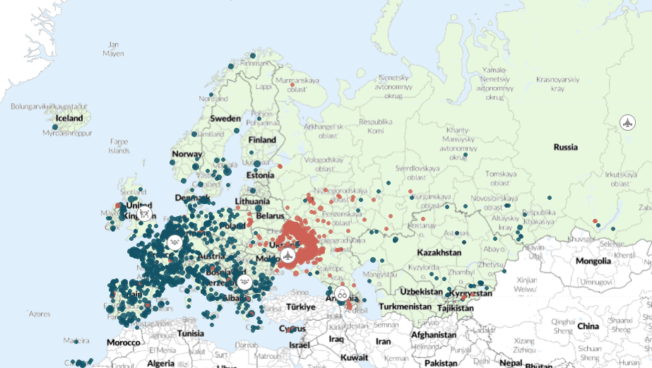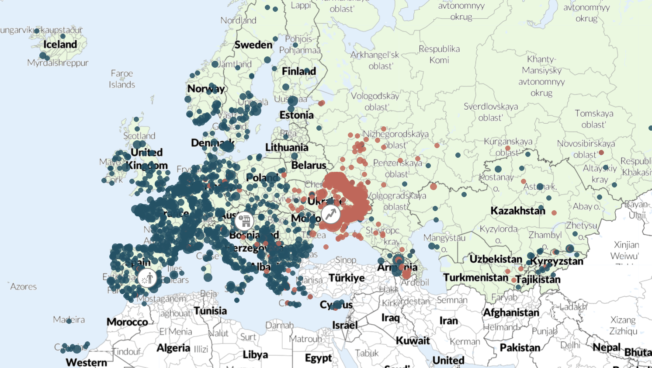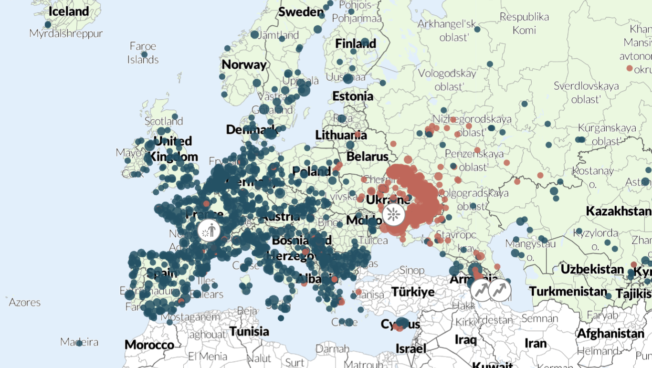Regional Overview
Europe & Central Asia
January 2023
Posted: 3 February 2023
 Ukraine: Civilian fatalities rise amid ongoing violence by Russian forces
Ukraine: Civilian fatalities rise amid ongoing violence by Russian forces
Russian forces continued coordinated missile and drone strikes across Ukraine in January, leading to increased civilian fatalities as a result of shelling, missile strikes, and airstrikes compared to the month prior. The deadliest incident took place on 14 January, when a Russian missile hit a residential building in Dnipro, reportedly killing over 40 civilians and injuring at least 80. Around a dozen more civilians were reportedly killed in explosions of landmines and remnants of war in the Kherson and Donetsk regions. Russia also continued to oppress the local population by forcibly displacing civilians and abducting aid workers from the occupied parts of the Donetsk, Kherson, and Zaporizhia regions. Meanwhile, Russian police detained over 30 Crimean Tatars during a protest in Simferopol, with some reportedly enduring torture while in detention.
Daily fighting between Ukrainian and Russian forces continued, with Russian forces securing marginal territorial gains around Bakhmut in the Donetsk region. Increased fighting was recorded in the areas of Huliaipole and Orikhiv in the Zaporizhia region, where Russia claimed to have captured several settlements on 20 January. Russian ground attacks in the area seem to have ceased since 26 January.
For more information, see ACLED’s Ukraine Crisis Hub
 Armenia-Azerbaijan: Food and power shortages due to the closure of the Lachin corridor
Armenia-Azerbaijan: Food and power shortages due to the closure of the Lachin corridor
As the blockade of the Lachin corridor linking the Republic of Artsakh to Armenia continues, the de facto authorities of Artsakh introduced caps on the purchase of key food items. Shortages of medicines were also reported, with frequent electricity cuts and disruptions to internet connection due to damage to a power line in the area of the Lachin corridor. Additionally, Azerbaijan periodically cut gas supply to Artsakh throughout the month amid freezing temperatures. The blockade continued to cause protests in Armenia and Artsakh.
Despite the tensions around the blockade of the Lachin corridor, fighting reduced significantly along the Armenia-Artsakh-Azerbaijan Line of Contact in January. An Armenian serviceman was wounded in cross-border fire in Yeraskh, Ararat region. Separately, an Azerbaijani civilian was reportedly killed by unexploded ammunition in the Khojavend region. Meanwhile, on 23 January, the European Union approved a two-year 100-strong civilian mission to Armenia tasked with monitoring the situation in its border areas.
 Italy, Germany, Spain: Anarchist activity against 41-bis prison regime continues
Italy, Germany, Spain: Anarchist activity against 41-bis prison regime continues
Anarchists continued to engage in demonstrations and violent activity across Italy in opposition to the 41-bis prison regime under which an Informal Anarchist Federation leader, Alfredo Cospito, is currently being detained. Cospito has been on hunger strike for more than 100 days and was recently moved to a prison facility in Milan due to his deteriorating health. Suspected anarchists also targeted Italian government targets in Spain and Germany. In Barcelona, anarchists damaged the window of the Italian consulate and left graffiti on the building demanding the release of Cospito, while an Italian diplomat’s car was set on fire in front of the Italian embassy in Berlin.
 Kazakhstan, Uzbekistan, Kyrgyzstan: Protests over energy and heating supply disruptions
Kazakhstan, Uzbekistan, Kyrgyzstan: Protests over energy and heating supply disruptions
Disruption in electricity and heating supply due to severe weather conditions led to protests in Kazakhstan, Uzbekistan, and Kyrgyzstan last month. In Kazakhstan, protests were staged mainly in the border regions, as weather conditions led to the lack of power, natural gas, and water supply. In Kyrgyzstan, people staged a protest in the Jalal-Abad region after the government was forced to ration the supply of electricity due to a sharp increase in consumption.1News.am, 14 January 2023 In Uzbekistan, similar demonstrations led to road blockades in the town of Chirchiq in the Tashkent region and Andijan. Uzbek President Shavkat Mirziyoyev subsequently dismissed a number of top government officials and the mayor of Tashkent for failing to manage the energy supply emergency.2Intellinews, 16 January 2023 Amid the energy supply crisis, the Uzbek government decided to start importing gas from Russia for the first time in decades, as Russia attempts to reroute energy export from the EU to the Asian markets due to the armed conflict in Ukraine.3The Moscow Times, 26 January 2023
See more
See the Codebook and the User Guide for an overview of ACLED’s core methodology. For additional documentation, check the Resource Library. Region-specific methodology briefs can be accessed below.
Links:
For additional resources and in-depth updates on the conflict in Ukraine, check our dedicated Ukraine Crisis Hub.







